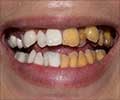FAQs on Root Canal Treatment
1. Which doctor should I consult for Root Canal Treatment?You can consult a general dentist or endodontist for root canal treatment.
2. Is root canal treatment painful?
One of the great fears about this kind of treatment is that it will be painful, but the entire treatment procedure is painless. The treatment does not cause pain; it helps to reduce it. After the treatment, slight pain is felt. It is temporary, and pain medications may be enough to relieve it.
3. What is the benefit of getting the root canal treatment?
The cost factor is the biggest beneficial factor which is relatively less when the person is undergoing root canal treatment. If it to aggravates further, then the last treatment resort will be extraction, which is quite much more expensive as compared to the root canal treatment.
4. How long does it take to fully recover from a root canal treatment?
The time is taken for root canal recovery also depends on your condition. The mild discomfort that the patient experiences generally will vanish in a week. If the treated tooth had severe inflammation or infection, then the recovery will take longer. It might take up to three weeks for such cases.
5. When should I seek help after root canal treatment?
After the root canal treatment, pain should decrease over time. If you still experience pain or swelling, you should see your dentist. Most people need one to two sessions for a root canal to be successful. In severe cases, you may need more cleaning sessions. Recurring pain could be an indicator of this.
6. What should you not do before a root canal treatment?
Avoid alcohol and tobacco intake for a full 24 hours before the procedure. Eat well and take the prescribed medications before the procedure. Most importantly have a night’s sleep before the procedure.
7. Why jaw pain occurs after root canal treatment
Since root canal treatment requires you to hold your mouth open for a long period, you may experience some discomfort in the jaw. This pain could radiate to your ear, particularly if you were treated for an upper tooth.









